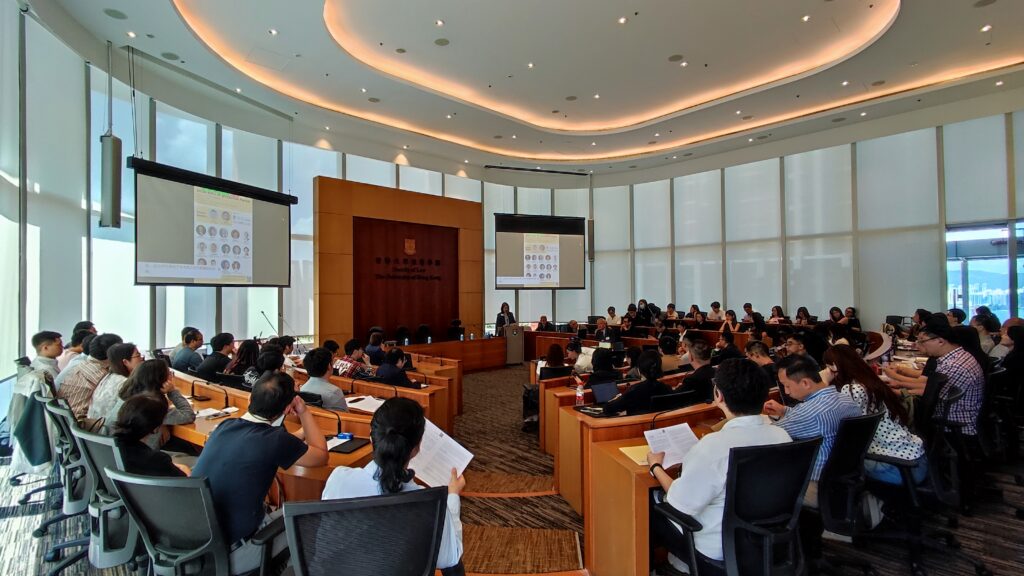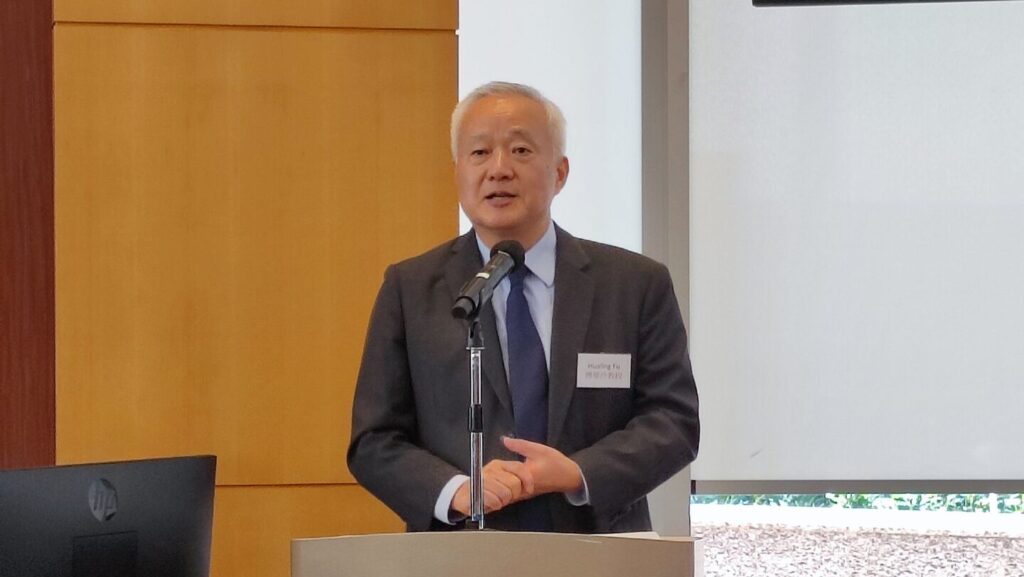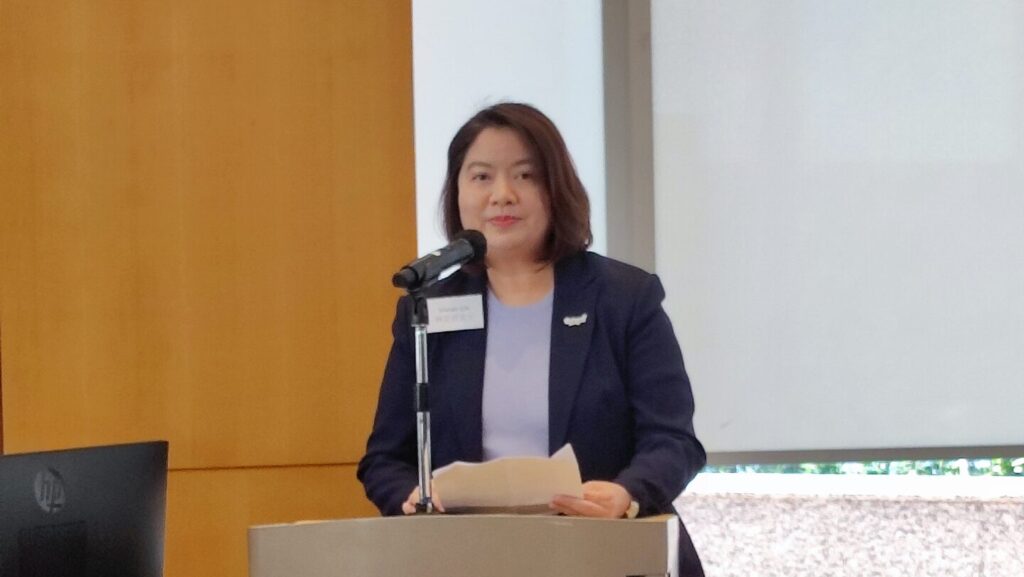Pooling Diverse Wisdom, Shaping an Efficient Ecosystem
On the afternoon of October 15, 2025, the “2025 IP Utilization Forum,” co-organized by the Faculty of Law of The University of Hong Kong (HKU), the Philip K. H. Wong Centre for Chinese Law, and the National IP Operation (Shenzhen Hetao) International Transformation Pilot Platform, was successfully held at the Academic Conference Room, 11th Floor, Cheng Yu Tung Tower, HKU. Under the central theme “From Protection to Utilization,” the forum aimed to bridge the gap between intellectual property (IP) theory and practice, exploring how intangible creative assets such as patents, trademarks, and copyrights can be transformed into strategic drivers of high-quality development.
The forum featured keynote speeches, thematic panel discussions, practical experience sharing, and a roundtable dialogue, bringing together more than twenty renowned scholars and industry leaders from the Chinese Mainland, Hong Kong, Taiwan, and Singapore, across the fields of law, economics, technology, and public policy. Participants engaged in deep exchanges around the critical question of “How to truly utilize IP?” showcasing strong practical concern and forward-thinking perspectives.
The event began with welcome remarks by Professor Hualing Fu, Dean of the HKU Faculty of Law, who highlighted the ongoing shift in IP’s role from a purely legal tool towards a strategic pillar of national policy amid rapid global changes and intensified technological competition. Following this, Ms. Vivian Lin, Chief Operating Officer of the Hong Kong Productivity Council, delivered opening remarks, explaining how the Productivity Council integrates government funding mechanisms to promote technological commercialization, particularly through building IP ecosystems for SMEs and emerging industries.
Moderated by Professor Yahong Li of HKU Faculty of Law, the keynote speech of the afternoon was presented by Professor Ma Yide, Dean and Chair Professor of the University of Chinese Academy of Sciences and a Delegate of the National People’s Congress. His address, “Strategic Transformation of IP Utilization: Theoretical Reconstruction and Chinese Practices,” systematically explored IP’s evolution from private right protection toward a central role in national governance, highlighting China’s current challenges, including structural imbalances, weaponization of IP rights, and policy fragmentation. Professor Ma advocated building a modern IP governance system integrating protection, utilization, management, and services, emphasizing the Guangdong-Hong Kong-Macao Greater Bay Area’s role in pioneering IP financialization and transaction mechanisms.
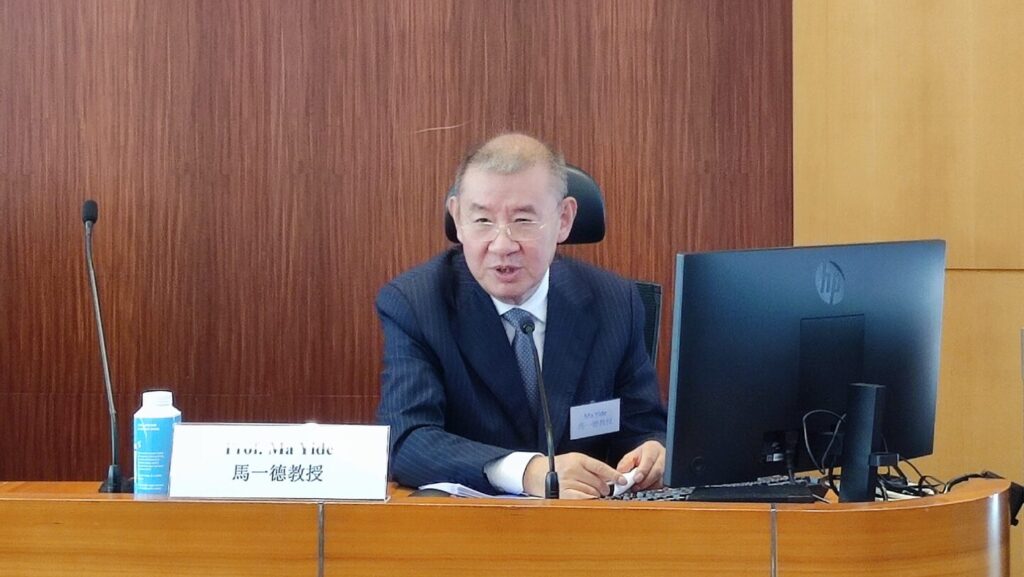
Panel One, “The Importance of IP Utilization,” was moderated by Professor Tianxiang He from the City University of Hong Kong. Professor Kung-Chung Liu from Singapore Management University delivered a presentation titled “Commercialization of Patents Must Go Hand in Hand with Trade Secrets.” He emphasized that companies like TSMC rely on trade secrets to protect approximately 90% of their core technologies, highlighting that while patents form a defensive boundary, it is trade secrets that truly propel technological breakthroughs. Professor Zhang Ping from Peking University examined how intellectual property supports the national innovation system through the lenses of market mechanisms and industrial policies. She noted that each corporate decision regarding IP utilization serves simultaneously as a market action and a policy signal, particularly in emerging fields such as artificial intelligence, large-scale models, and open-source software, where legal boundaries are continually being reshaped. Emeritus Professor Jerry Fong from National Chengchi University shared Taiwan’s institutional innovations for addressing “patent troll” litigation. Taking the establishment of the LOT Network as an example, he presented how strategic, platform-based alliances can effectively defend against external infringement, showcasing a novel approach to the collective utilization of intellectual property.
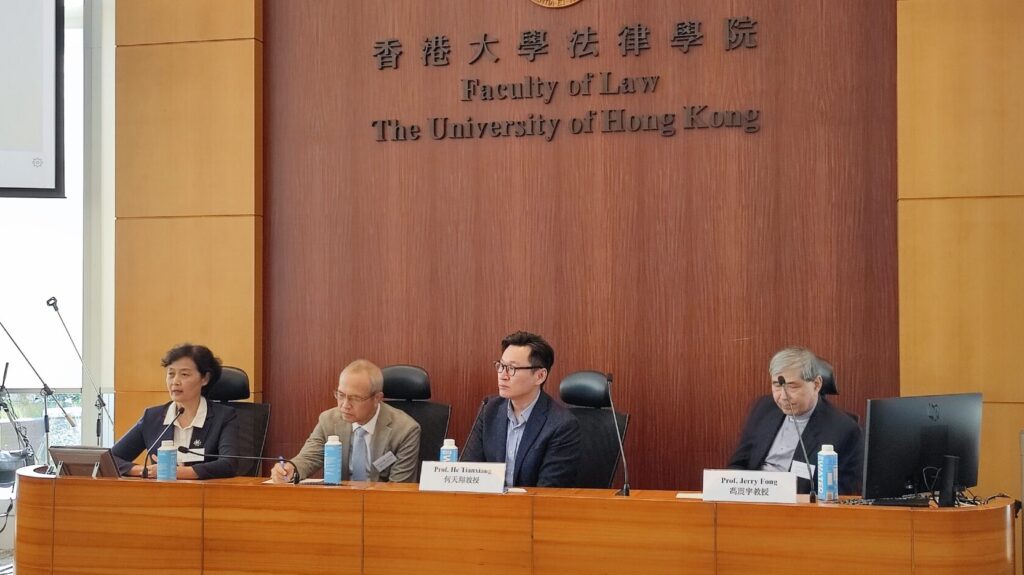
Panel Two, “Successful Models for IP Utilization,” was moderated by Professor Taorui Guan from the Faculty of Law at HKU. Dr. Fan Shiliang, Director of the National Intellectual Property Operation (Shenzhen Hetao) International Transformation Pilot Platform, presented how his platform leverages digital tools to reshape pathways for the commercialization of technological achievements. He advocated modularizing and digitizing technical knowledge into recombinable “technology data packages” and proposed resolving efficiency and trust bottlenecks in cross-border IP transactions through digital platforms. Professor Thomas Wong, Chairman of the Arts, Cultural, Creative Industries and Intellectual Property Committee at the Chinese Manufactures Association of Hong Kong, emphasized the importance of Hong Kong capitalizing on its dual advantages—the “twin engines” of financialization and the rule of law—to establish robust systems for IP valuation and circulation. He argued for creating an IP asset platform capable of mutually empowering hard-tech and creative cultural industries, positioning Hong Kong as a global settlement hub for IP transactions. Dr. Alfred Tan, Deputy Director of the Technology Transfer Office at HKU, shared experiences and challenges faced by universities in commercializing research outcomes, highlighting universally common difficulties such as insufficient technological maturity, financing barriers, and misalignment of institutional incentives. He stressed that technology transfer is not merely a one-way licensing activity but necessitates the systemic construction of an interconnected ecosystem involving academia, enterprises, investors, and service providers. Mr. Shen Hongfei, Vice President of the Legal Affairs Department and Director of the Key Project Department at Huawei, provided practical insights, proposing that patent operations should focus on commercially significant key fields, adopting strategies that integrate standardized licensing, reasonable pricing, and diversified protection mechanisms to achieve sustainable IP transformation amid complex global conditions.
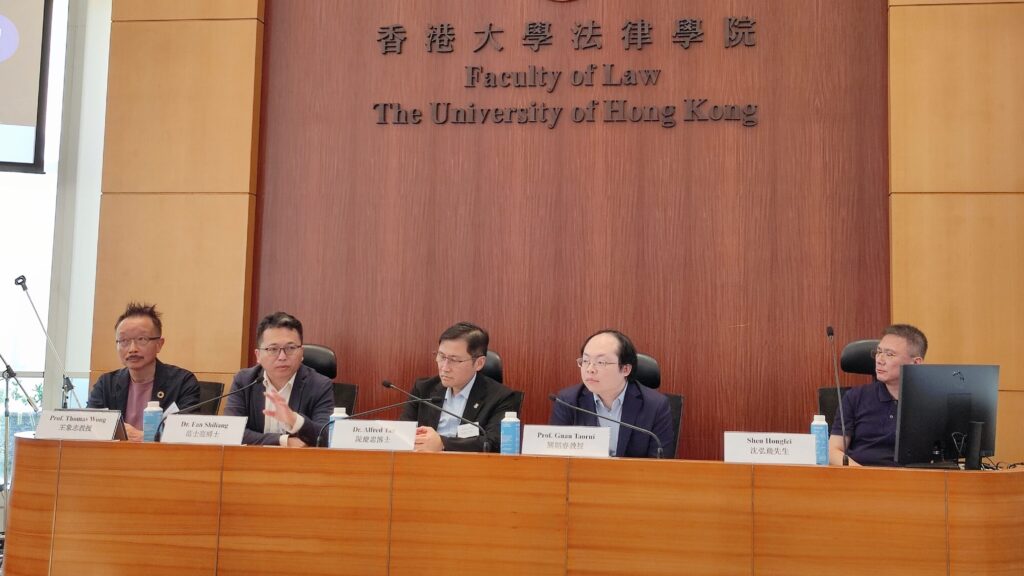
The evening session commenced under the moderation of Professor Kung-Chung Liu. Mr. Alan Fan, Vice President and Head of the IP Department at Huawei, delivered the forum’s second keynote speech entitled “IP Licensing in the AI Era.” He highlighted that IP licensing in the age of artificial intelligence must simultaneously accommodate technological scalability, transactional convenience, and institutional adaptability. He proposed establishing mechanisms for sharing AI training data and leveraging trademark systems to foster industry cluster identity, thereby promoting the emergence of an open, compatible, and innovative IP ecosystem.
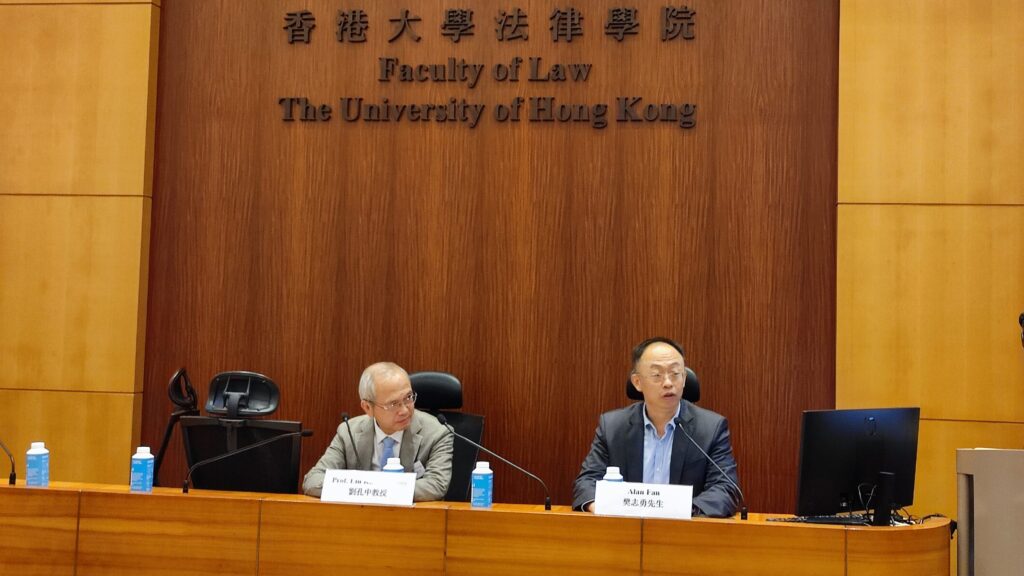
In the third panel that focused on “Hong Kong’s Role and Prospects as an IP Trading Center,” Dr. Maria Tam G.B.M., Barrister and former Deputy Director of the Hong Kong Basic Law Committee, delivered a presentation highlighting that China’s 14th Five-Year Plan explicitly supports Hong Kong’s development as a regional IP trading hub. On this basis, she recommended establishing a valuation and certification system, expanding financing channels, and advocating for the central government to create a “Mainland Patent Licensing Platform in Hong Kong,” thus providing an institutional channel for domestic innovation to connect with overseas markets. Professor Heiwai Tang, Associate Vice-President of HKU, presented economic data demonstrating rapid IP growth across Asia but noted that Hong Kong continues to experience a deficit in IP-related revenue, indicating significant room for development. He proposed that Hong Kong should deepen its tax incentives, establish comprehensive IP financing tools, and actively promote the commercialization of research achievements. Dr. John Zhao, Vice President of Beijing Zhizhuan Beidou IP Consulting Co. Ltd., pointed out that despite China’s abundant innovation resources, there remains a mismatch in its capacity to generate IP-related revenue. He emphasized that Hong Kong, leveraging its legal system, professional services, and financial connectivity, can serve as a valuable bridge to help Chinese technological innovations enter global markets.
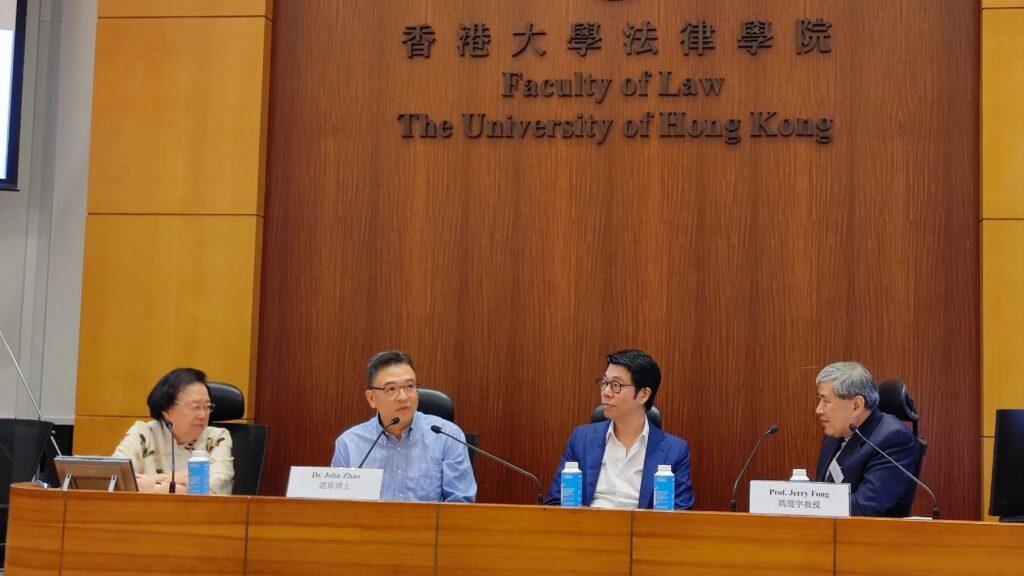
Finally, the forum concluded with a roundtable discussion moderated by Professor Yahong Li. Discussants included Professor Heiwai Tang, Mr. Alan Fan, Dr. Fan Shiliang, and Mr. Johnson Kong, Board Member of the International IP Commercialization Council. Together, they engaged in an in-depth exploration and future-oriented discussion on critical topics such as IP valuation mechanisms, dispute resolution, and regional collaboration, sharing their insights and visions for the future development of intellectual property utilization.
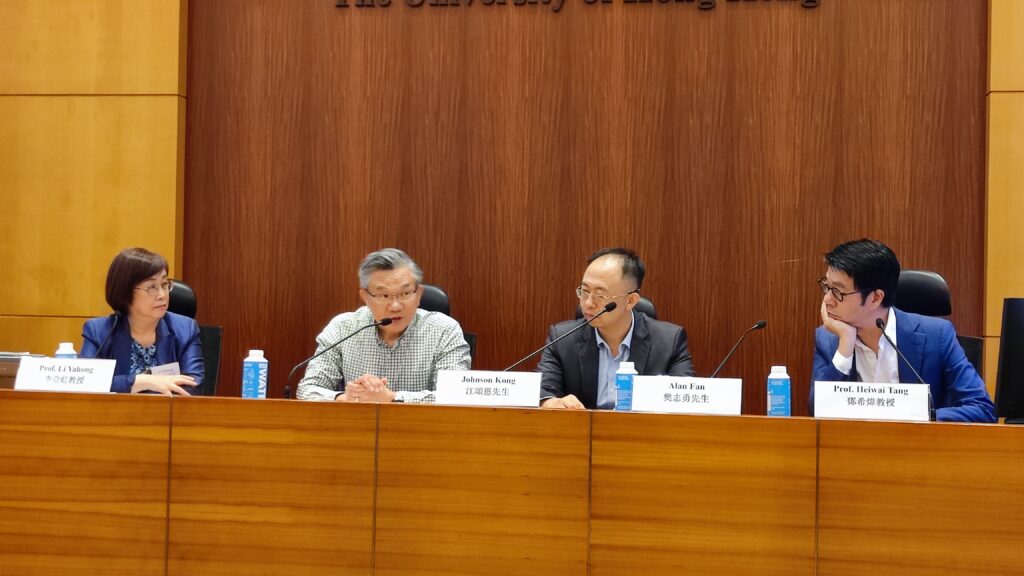
The forum concluded successfully with closing remarks by Professor Yahong Li. She highlighted that the day’s discussions vividly demonstrated the ongoing transformation of the intellectual property system—from a singular, “protection-oriented” framework to a complex, “value-driven” ecosystem. A successful IP framework, she emphasized, should ensure rights are visible, usable, convertible, and tradable, truly serving innovation and development. This forum not only brought together diverse participants and stimulated intellectual exchanges but, more importantly, established a high-level interdisciplinary, cross-regional, and cross-sectoral dialogue platform. Under the contemporary theme “From Protection to Utilization,” this platform has forged a consensus on cooperation, facilitating regional synergy and deeper integration with national strategies, thus collectively drawing a new blueprint for the effective realization of intellectual property’s value.
The forum attracted widespread attention and enthusiastic responses from various sectors, gathering over 100 scholars, students, practicing lawyers, and other professionals from the Chinese Mainland and Hong Kong. Participants actively engaged in questions and discussions, demonstrating strong interest in the forum’s themes and expressing hope for more such thematic discussions in the future.
